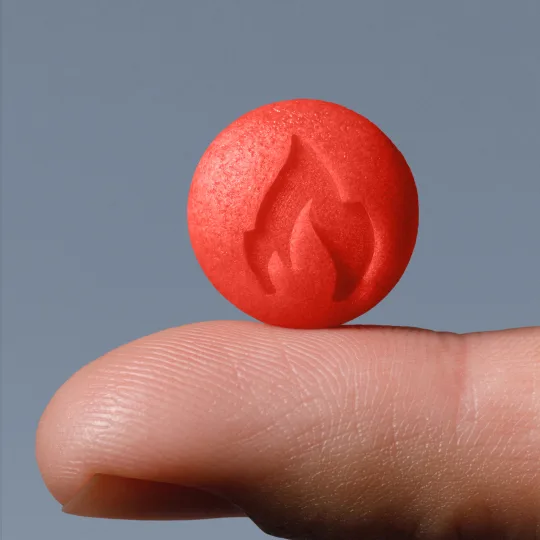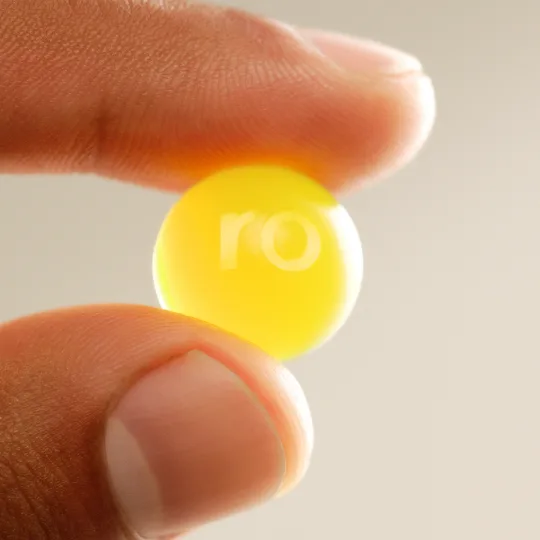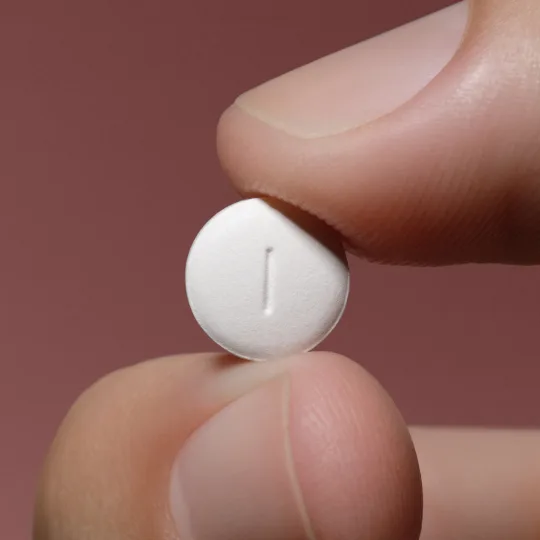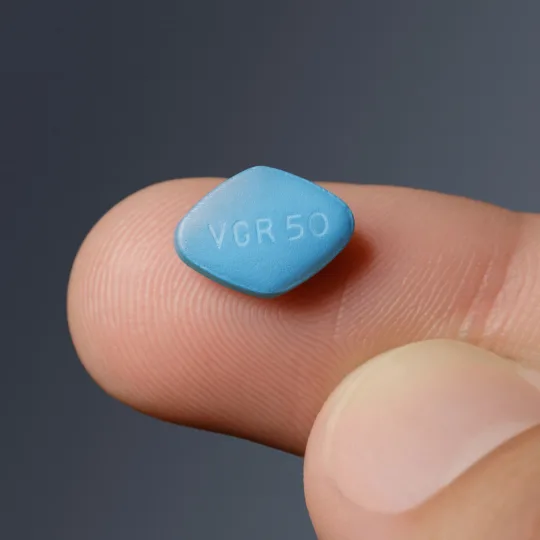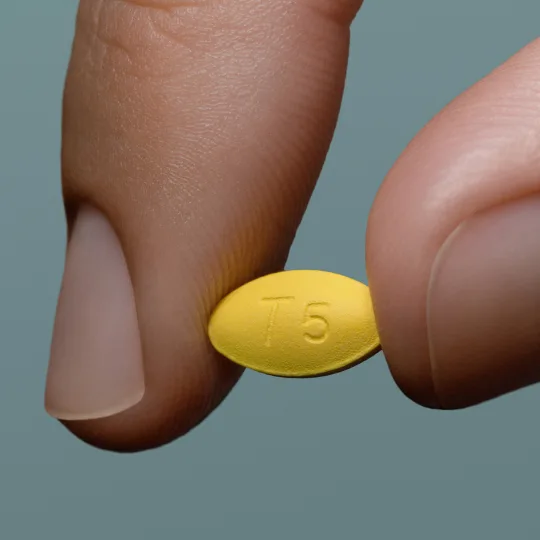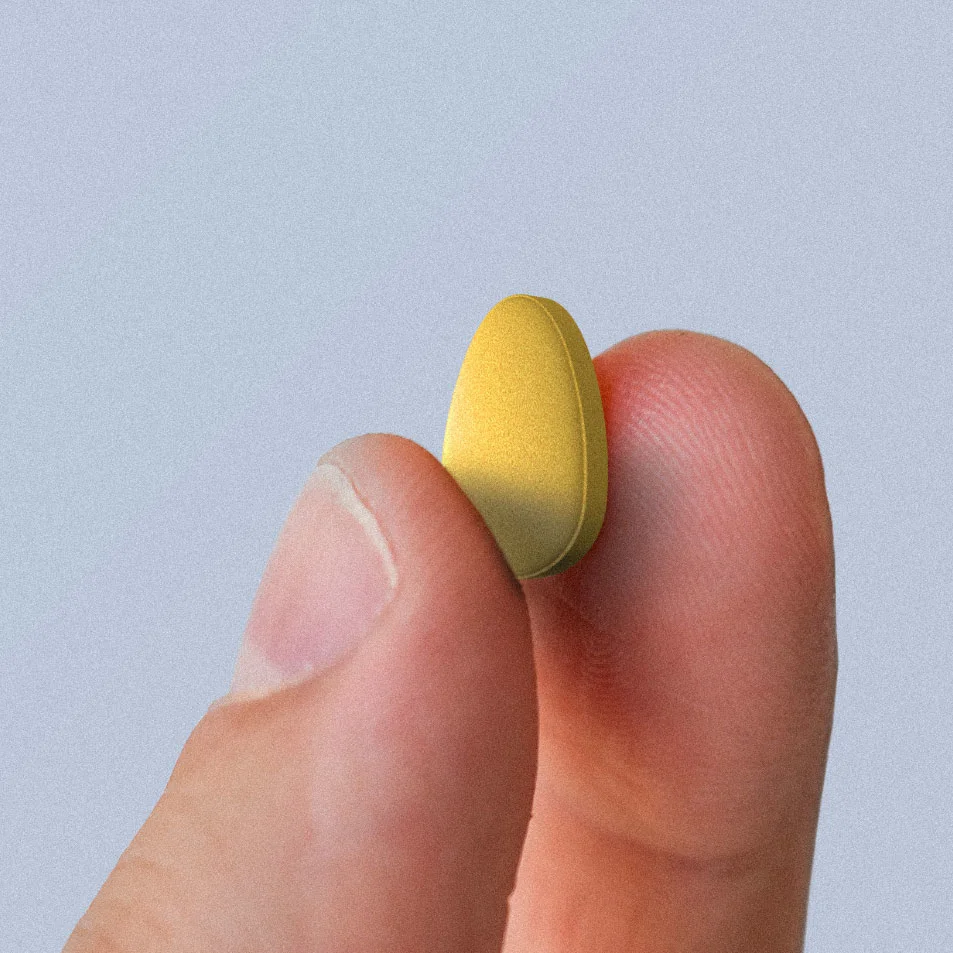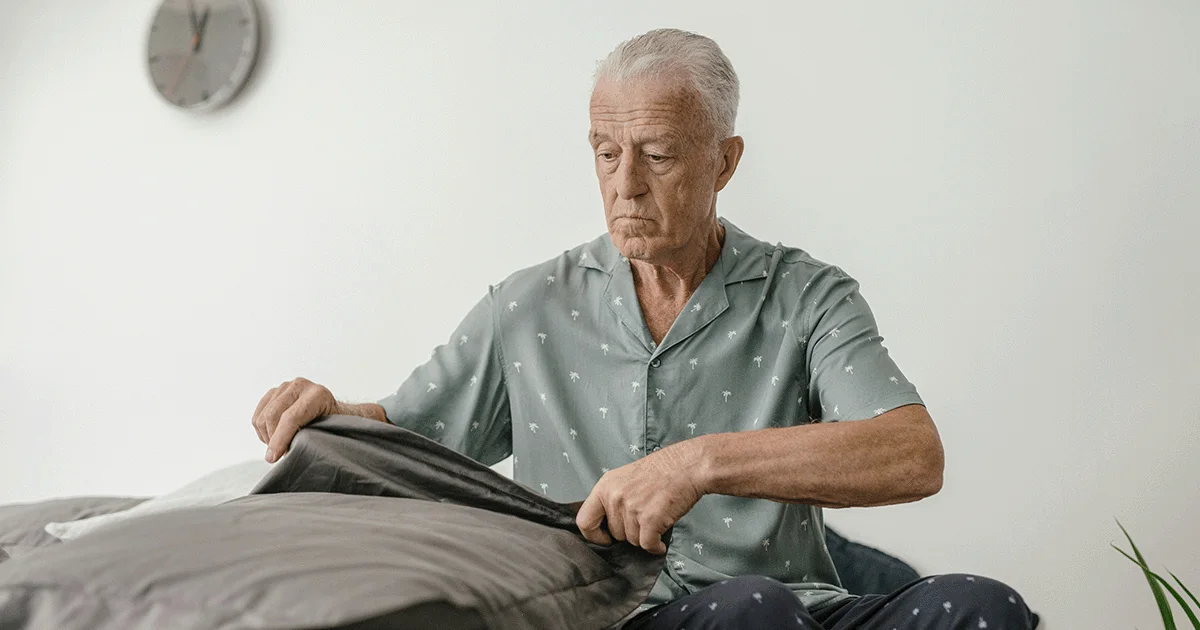Key takeaways
Adderall can cause erectile dysfunction (ED), due to hormone changes and blood flow issues.
If you experience ED while taking Adderall, speak with a healthcare provider to address your symptoms.
Sometimes, changing your Adderall dosage can help lessen side effects, including ED.
Here's what we'll cover
Here's what we'll cover
Here's what we'll cover
Key takeaways
Adderall can cause erectile dysfunction (ED), due to hormone changes and blood flow issues.
If you experience ED while taking Adderall, speak with a healthcare provider to address your symptoms.
Sometimes, changing your Adderall dosage can help lessen side effects, including ED.
Adderall is quite effective at treating ADHD and narcolepsy. But like any medication, it can cause side effects. It can affect men’s sexual health by causing erectile dysfunction (ED), along with other sexual side effects.
Keep reading if you’re concerned about Adderall causing erectile dysfunction, and what you can do if you notice changes in your sex drive or performance.
Does Adderall cause erectile dysfunction?
Yes, Adderall can cause erectile dysfunction in some people as a side effect of the medication. Adderall (dextroamphetamine/amphetamine) is a prescription medication used to treat attention-deficit/hyperactivity disorder (ADHD) and narcolepsy.
Not everyone will experience ED on Adderall — only 2–4% of study participants report ED as a side effect. In fact, some people with a penis (for the sake of simplicity, we’ll refer to this as a man or men from here on) may be pleasantly surprised to find they have better erections when taking Adderall.
Adderall sexual side effects aren’t common, but a few have been reported in studies — and they can vary quite a bit from person to person:
ED (aka impotence)
Frequent erections
Longer-lasting erections
Low sex drive or changes in libido
ED in general tends to affect older men more than younger men, according to Justin Houman, MD, a board-certified urologist and men's sexual and reproductive health specialist. But Dr. Houman explains that younger men can be more sensitive to Adderall’s side effects. This means, younger men are more likely to have ED while taking Adderall.
This might be due to differences in how younger men metabolize, or absorb, the medication in their body. Younger people have faster metabolisms and more efficient livers on average, which means they can break down and clear Adderall easier from their systems.
But this can also cause ups and downs with the chemicals in your brain like dopamine and norepinephrine. This can lead to sexual side effects like ED. But increasing dopamine (the “feel good” neurotransmitter) can have the opposite effect sometimes. In fact, Adderall has been used to help treat sexual side effects caused by other medications.
All that’s to say, different people respond differently to medications, and you’ll have to see how it affects you if your provider thinks it’s right for you.
Have better sex with Ro
Why can Adderall cause erectile dysfunction?
Dr. Houman says Adderall can cause ED because of both hormone and blood flow changes.
First, Adderall increases dopamine and norepinephrine. These hormones regulate sexual arousal. When they get out of balance, it can affect your usual sexual responses — like getting an erection or feeling interested in sex, known as your libido. But dopamine also plays a role in orgasm, soon on the other side of the coin, Adderall can also make it easier to climax.
Second, Adderall can decrease blood flow needed for an erection. Both dopamine and norepinephrine are vasoconstrictors, which means they make blood vessels tighten up, so less blood can get to the penis to make it hard.
Adderall can increase these hormone levels, triggering the body’s fight or flight response. This causes blood vessels to tighten and reduces blood flow to the penis during sexual activity.
There are also a few ways Adderall can indirectly contribute to sexual dysfunction, including:
Adderall can cause difficulty sleeping, known as insomnia. If you’re sleep-deprived, it can affect your physical and mental health, including problems with ED.
Adderall is a stimulant, and stimulants can increase restlessness and anxiety. Sexual performance can be affected by anxiety, which can lead to a cycle of fear and self-doubt. This can lower sexual desire and decrease one’s ability to get an erection.
How to treat erectile dysfunction from Adderall: 3 ways
As distressing as ED can be, this side effect from Adderall isn’t permanent, and you can treat ED symptoms from Adderall in three primary ways. Talk with your healthcare provider to figure out the options to treat ADHD or narcolepsy symptoms while maintaining your sexual health.
1. Adjust or switch your medication
Adjusting your Adderall dosage (under the guidance of your healthcare provider) or taking it at a different time of day may help improve ED.
Slightly decreasing your Adderall dose can keep the benefits of Adderall, while reducing the impacts on your sex life, according to Dr. Houman. Another option is changing the timing of your dose. For example, if you want to engage in morning sexual activity, Dr. Houman recommends taking Adderall right after.
If these don’t help, you can consider switching to another ADHD or narcolepsy medication. "Different stimulant medications can have varying effects on sexual health," Dr. Houman says. Switching medications can be helpful if you’re dealing with libido or performance issues.
Just make sure to get the okay from your healthcare provider before making any changes to your medication.
2. Improve your lifestyle habits
Dr. Houman says some lifestyle changes can naturally boost testosterone levels and may improve ED concerns, including:
Getting regular exercise. Work cardiovascular exercises, like walking, cycling, or swimming, and weight training into your routine. A 2020 study shows these exercises may boost testosterone levels and improve blood flow to the penis.
Eating a balanced diet. Eating nutrient-dense foods, like lean proteins, healthy fats, and plenty of fruits and vegetables, can help your hormones, including testosterone, work better.
Getting plenty of sleep. Aim for 7–9 hours of quality sleep. This helps balance hormones and improve your energy, mood, and sexual health.
Managing your stress levels. Stress can increase the body's cortisol levels, which in turn, blocks testosterone from being made. Deep breathing exercises and mindful meditation can decrease cortisol levels and improve ED symptoms.
3. Treat ED with medication
One of the best ways to treat ED is with prescription medications that bring blood flow to the penis. These include:
Stendra (avanafil)
These medications are all part of a drug class called phosphodiesterase type 5 (PDE5) inhibitors. They work by keeping the blood vessels in the penis relaxed, which brings steady blood flow to the penis so you can get and maintain an erection.
PDE5 inhibitors don't cause spontaneous erections, but they help you get and stay hard if you’re sexually aroused.
For convenience, you can get PDE5 inhibitors in other forms, such as Ro Sparks. It’s a combination of tadalafil and sildenafil in a dissolvable tablet that you place under your tongue for quicker effects. And Daily Rise Gummies give you 7 mg of tadalafil per fruit-flavored gummy. This makes them an easy, discreet, and flavorful option for daily use. The active ingredients are FDA-approved, but these products are made by pharmacists and may be a good option if you dislike swallowing pills.
Does Adderall make you last longer?
Possibly. Exactly how Adderall affects sexual function is still not completely understood and it can affect people differently. Some people have decreased interest in sex and ED, but others notice prolonged erections.
Dr. Houman says Adderall is used off-label to treat delayed ejaculation (DE). This is a condition where it takes unusually long to ejaculate. One study found that taking Adderall helped men with DE reach climax faster.
One reason Adderall can help with DE is because of dopamine (remember that hormone from earlier?). Dopamine plays a role in the brain’s pleasure and reward mechanisms, and higher levels can make sexual activity more intense. This helps decrease the time it takes to reach orgasm for some men.
Another reason Adderall can give you better sex is it gives you better focus. If you have ADHD, Adderall can help reduce distractions and increase attention. By preventing your mind from wandering during time with your partner, it can give you a better sexual experience.
Does Adderall impact sexual desire?
Adderall can certainly impact sexual desire, but what exactly that means can be different for different people. The increased levels of dopamine and norepinephrine can definitely heighten sexual interest in some. In others, this same hormone increase can make you less interested in sex.
Your age and Adderall dosage can both play a role in which one of these happens to you.
Lower doses of Adderall might only have a small impact on your libido, or even make you more interested in sex (again, from that dopamine boost giving you enhanced focus and pleasure). But higher dosages might have the opposite effect because overstimulation of the nervous system can lower your sex drive and make it harder to get an erection. In higher doses, Adderall can cause concerns like:
Increasing other Adderall side effects like anxiety, insomnia, and irritability
Raising your heart rate and blood pressure, which can be dangerous for your health
So play it safe, and take your Adderall dose exactly as it’s prescribed by your healthcare provider.
Bottom line
Adderall helps manage ADHD and narcolepsy symptoms by improving focus, impulse control, and alertness. But it can sometimes cause side effects like low sex drive or ED. Here’s a recap of what we learned about the relationship between Adderall and ED:
Adderall can cause ED by affecting hormone levels and blood flow to the penis. Adderall can affect dopamine and norepinephrine levels, which play a role in sexual desire, arousal, and the ability to get hard.
Adderall’s other side effects, like insomnia and anxiety, may worsen ED. Not getting enough sleep or feeling anxious can lower testosterone, raise stress hormones like cortisol, and affect your mood and sexual health.
There are helpful treatments to manage ED while taking Adderall. Working with your healthcare provider, you might adjust your dose or switch medications to treat ADHD or narcolepsy. Lifestyle changes like diet, exercise, and managing stress can also help improve ED symptoms.
You might need to add medication to treat ED. Sometimes, ED just won’t go away, and you can consider a medication like Viagra or Cialis to help you get hard while taking Adderall.
You don’t have to deal with ED issues on your own. Don’t feel embarrassed to tell your healthcare provider about your Adderall sexual side effects. ED and other sexual concerns can happen while taking Adderall and are usually not permanent. There are options that can help.
Frequently asked questions (FAQs)
What is Adderall?
Adderall is a prescription stimulant medication that helps to treat the symptoms of ADHD and narcolepsy. It works by increasing hormones like dopamine and norepinephrine in the brain to give you better concentration and focus. It can also help improve alertness in people with narcolepsy.
Does Adderall affect erections?
Adderall can affect erections by making it more difficult to get hard. This is because Adderall can constrict blood flow to the penis. Hormone imbalances can also overstimulate your nervous system, which also can cause erection problems and lowered libido.
Does Adderall affect your prostate?
Adderall doesn’t directly affect the prostate, but it may cause urinary retention, which is trouble fully emptying the bladder. This can happen because amphetamines (such as Adderall) can affect the muscles and nerves that control urination. In men, urinary retention is often related to an enlarged prostate (benign prostatic hyperplasia, or BPH). So, Adderall-related urinary retention could make BPH symptoms worse. If you notice difficulty urinating while taking Adderall, it’s a good idea to let your healthcare provider know.
Side note: Cialis (tadalafil) is a common ED medication that’s also approved to treat BPH symptoms. It helps relax muscles in the bladder and prostate, which can improve urine flow and ease urinary symptoms. For men who have both ED and BPH, Cialis offers dual benefits.
Can Adderall cause horniness?
Yes, you can get more horny while taking Adderall, but the medication affects everyone a little differently depending on age and Adderall dosages. Some people might notice they actually have better erections and a higher sex drive with Adderall. This can make you more interested in sex.
Can Adderall make it hard to climax?
Adderall can actually make it easier for some people to climax because of increased dopamine levels in your body. In fact, some people who have issues with taking longer than usual to climax take Adderall to help them orgasm faster.
DISCLAIMER
If you have any medical questions or concerns, please talk to your healthcare provider. The articles on Health Guide are underpinned by peer-reviewed research and information drawn from medical societies and governmental agencies. However, they are not a substitute for professional medical advice, diagnosis, or treatment.
Viagra Important Safety Information: Read more about serious warnings and safety info.
Cialis Important Safety Information: Read more about serious warnings and safety info.
References
Andersson, K. E. (2018). PDE5 inhibitors - pharmacology and clinical applications 20 years after sildenafil discovery. British Journal of Pharmacology, 175(13), 2554–2565. doi: 10.1111/bph.14205. Retrieved from https://pmc.ncbi.nlm.nih.gov/articles/PMC6003652/
Bauer, S. R., Breyer, B. N., Stampfer, M. J., et al. (2020). Association of diet with erectile dysfunction among men in the health professionals follow-up study. JAMA Network Open, 3(11), e2021701. doi: 10.1001/jamanetworkopen.2020.21701. Retrieved from https://pubmed.ncbi.nlm.nih.gov/33185675/
Chou, N. H., Huang, Y. J., & Jiann, B. P. (2015). The impact of illicit use of amphetamine on male sexual functions. The Journal of Sexual Medicine, 12(8), 1694–1702. doi: 10.1111/jsm.12926. Retrieved from https://pubmed.ncbi.nlm.nih.gov/26147855/
El-Osta, A., Kerr, G., Alaa, A., et al. (2023). Investigating self-reported efficacy of lifestyle medicine approaches to tackle erectile dysfunction: a cross-sectional eSurvey based study. BMC Urology, 23(1), 15. doi: 110.1186/s12894-023-01180-2. Retrieved from https://pmc.ncbi.nlm.nih.gov/articles/PMC9901095/
Gitlin, M. J. (1995). Treatment of sexual side effects with dopaminergic agents. The Journal of Clinical Psychiatry, 56(3), 124. Retrieved from https://pubmed.ncbi.nlm.nih.gov/7883734/
Johnson, A., Dymanus K., Quesada-Olarte, J., et al. (2024). Is Adderall effective in the treatment of delayed ejaculation? A continued retrospective analysis. The Journal of Sexual Medicine, 21, Issue Supplement_1, February 2024, qdae001.245. doi: 10.1093/jsxmed/qdae001.245. Retrieved from https://academic.oup.com/jsm/article/21/Supplement_1/qdae001.245/7600686
Kumagai, H., Yoshikawa, T., Zempo-Miyaki, A., et al. (2018). Vigorous physical activity is associated with regular aerobic exercise-induced increased serum testosterone levels in overweight/obese men. Hormone And Metabolic Research = Hormon- Und Stoffwechselforschung = Hormones Et Metabolisme, 50(1), 73–79. doi: 10.1055/s-0043-117497. Retrieved from https://pubmed.ncbi.nlm.nih.gov/28934816/
Leslie, S. W. & Rout, P. (2024). Male urinary retention: Acute and chronic. StatPearls. Retrieved from https://www.ncbi.nlm.nih.gov/books/NBK538499/
Lin, Y. S., Thummel, K. E., Thompson, B. D., et al. (2021). Sources of interindividual variability. Methods In Molecular Biology, 2342, 481–550. doi: 10.1007/978-1-0716-1554-6_17. Retrieved from https://pubmed.ncbi.nlm.nih.gov/34272705/
Liu, Q., Zhang, Y., Wang, J., et al. (2018). Erectile dysfunction and depression: a systematic review and meta-analysis. The Journal Of Sexual Medicine, 15(8), 1073–1082. doi: 10.1016/j.jsxm.2018.05.016. Retrieved from https://pubmed.ncbi.nlm.nih.gov/29960891/
Lowy, M. & Ramanathan, V. (2022). Erectile dysfunction: causes, assessment and management options. Australian Prescriber, 45(5), 159–161. doi: 10.18773/austprescr.2022.051. Retrieved from https://pmc.ncbi.nlm.nih.gov/articles/PMC9584785/
Melis, M. R., Sanna, F., & Argiolas, A. (2022). Dopamine, erectile function and male sexual behavior from the past to the present: a review. Brain Sciences, 12(7), 826. doi: 10.3390/brainsci12070826. Retrieved from https://pmc.ncbi.nlm.nih.gov/articles/PMC9312911/
Mladěnka, P., Applová, L., Patočka, J., et al. (2018). Comprehensive review of cardiovascular toxicity of drugs and related agents. Medicinal Research Reviews, 38(4), 1332–1403. doi: 10.1002/med.21476. Retrieved from https://pmc.ncbi.nlm.nih.gov/articles/PMC6033155/
Montejo, A. L., Prieto, N., de Alarcón, R., et al. (2019). Management strategies for antidepressant-related sexual dysfunction: a clinical approach. Journal of Clinical Medicine, 8(10), 1640. doi: 10.3390/jcm8101640. Retrieved from https://pubmed.ncbi.nlm.nih.gov/31591339/
National Guideline Centre (UK). (2018). Evidence review for safety of pharmacological treatment: Attention deficit hyperactivity disorder: diagnosis and management: Evidence review. NICE Guideline, 87. Retrieved from https://www.ncbi.nlm.nih.gov/books/NBK578097/
Nguyen, V., Dolendo, I., Uloko, M., et al. (2024). Male delayed orgasm and anorgasmia: a practical guide for sexual medicine providers. International Journal Of Impotence Research, 36(3), 186–193. doi: 10.1038/s41443-023-00692-7. Retrieved from https://pmc.ncbi.nlm.nih.gov/articles/PMC11035123/
Palmer, A. K. & Jensen, M. D. (2022). Metabolic changes in aging humans: current evidence and therapeutic strategies. The Journal of Clinical Investigation, 132(16), e158451. doi: 10.1172/JCI158451. Retrieved from https://pmc.ncbi.nlm.nih.gov/articles/PMC9374375/
Pires, B., Rosendo, L. M., Brinca, A. T., et al. (2023). The therapeutic potential of amphetamine-like psychostimulants. Life (Basel, Switzerland), 13(11), 2180. doi: 10.3390/life13112180. Retrieved from https://pmc.ncbi.nlm.nih.gov/articles/PMC10671856/
Riachy, R., McKinney, K., & Tuvdendorj, D. R. (2020). Various factors may modulate the effect of exercise on testosterone levels in men. Journal of Functional Morphology and Kinesiology, 5(4), 81. doi: 10.3390/jfmk5040081. Retrieved from https://pmc.ncbi.nlm.nih.gov/articles/PMC7739287/
Skryabin, V. Y., Khoryaev, D., & Torrado, M. (2020). Changes in sexual behavior patterns due to stimulants use: three case reports. Journal of Addictive Diseases, 38(3), 375–379. doi: 10.1080/10550887.2020.1771236. Retrieved from https://pubmed.ncbi.nlm.nih.gov/32500822/
Smith, T. E., Martel, M. M., & DeSantis, A. D. (2017). Subjective report of side effects of prescribed and nonprescribed psychostimulant use in young adults. Substance Use & Misuse, 52(4), 548–552. doi: 10.1080/10826084.2016.1240694. Retrieved from https://pmc.ncbi.nlm.nih.gov/articles/PMC5704949/
Stutzman, D. L. & Dopheide, J. A. (2024). Practice pearls for stimulant treatment of attention-deficit/hyperactivity disorder in youth. The Journal Of Pediatric Pharmacology And Therapeutics : JPPT : The Official Journal Of PPAG, 29(3), 215–231. doi:10.5863/1551-6776-29.3.215. Retrieved from https://pmc.ncbi.nlm.nih.gov/articles/PMC11163912/
Treatment for Stimulant Use Disorders. (2021). Substance Abuse and Mental Health Services Administration (US); 1999. (Treatment Improvement Protocol (TIP) Series, No. 33.) Chapter 2—How Stimulants Affect the Brain and Behavior. Retrieved from https://www.ncbi.nlm.nih.gov/books/NBK576548/
Trinchieri, M., Trinchieri, M., Perletti, G., et al. (2021). Erectile and ejaculatory dysfunction associated with use of psychotropic drugs: a systematic review. The Journal Of Sexual Medicine, 18(8), 1354–1363. doi: 10.1016/j.jsxm.2021.05.016. Retrieved from https://pubmed.ncbi.nlm.nih.gov/34247952/
U.S. Food and Drug Administration (FDA). (2025). Adderall XR: Highlights of prescribing information. Retrieved from https://www.accessdata.fda.gov/drugsatfda_docs/label/2025/021303s042lbl.pdf
U.S. Food and Drug Administration (FDA). (2024). Adderall prescribing information. Retrieved from https://dailymed.nlm.nih.gov/dailymed/fda/fdaDrugXsl.cfm?setid=f22635fe-821d-4cde-aa12-419f8b53db81&type=display
U.S. Food & Drug Administration (FDA). (2023). Prescribing Information: Cialis (tadalafil) tablets, for oral use. Retrieved from https://dailymed.nlm.nih.gov/dailymed/fda/fdaDrugXsl.cfm?setid=bcd8f8ab-81a2-4891-83db-24a0b0e25895&type=display
Velurajah, R., Brunckhorst, O., Waqar, M., et al. (2022). Erectile dysfunction in patients with anxiety disorders: a systematic review. International Journal Of Impotence Research, 34(2), 177–186. doi: 10.1038/s41443-020-00405-4. Retrieved from https://pubmed.ncbi.nlm.nih.gov/33603242/
Wani, M., Hamdoon, M., Dewar, G., et al. (2022). Urological implications associated with the use of recreational drugs: a narrative review. Turkish Journal of Urology, 48(4), 254–261. doi: 10.5152/tud.2022.22066 Retrieved from https://pmc.ncbi.nlm.nih.gov/articles/PMC9612696/
Wu, Z., Lin, D., & Li, Y. (2022). Pushing the frontiers: tools for monitoring neurotransmitters and neuromodulators. Nature Reviews. Neuroscience, 23(5), 257–274. doi: 10.1038/s41583-022-00577-6. Retrieved from https://pmc.ncbi.nlm.nih.gov/articles/PMC11163306/
Zhang, F., Xiong, Y., Qin, F., & Yuan, J. (2022). Short sleep duration and erectile dysfunction: a review of the literature. Nature and Science Of Sleep, 14, 1945–1961. doi: 10.2147/NSS.S375571. Retrieved from https://pmc.ncbi.nlm.nih.gov/articles/PMC9621223/


